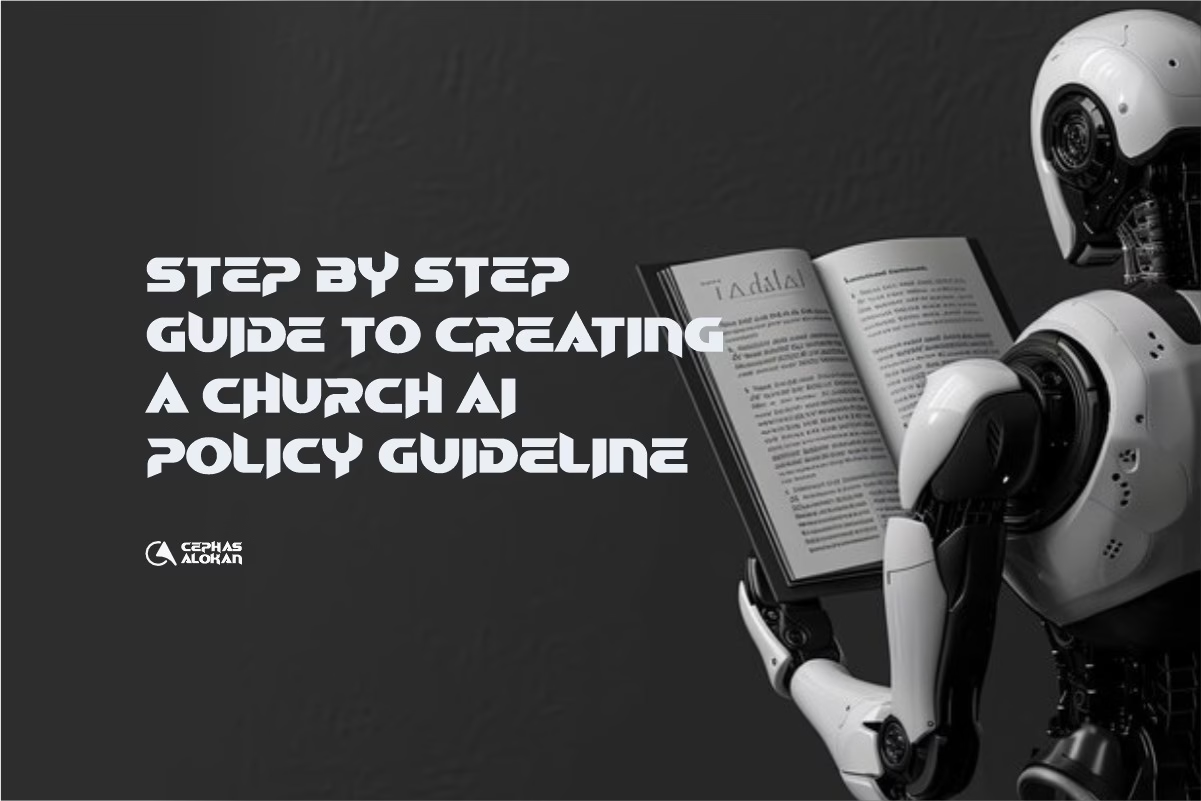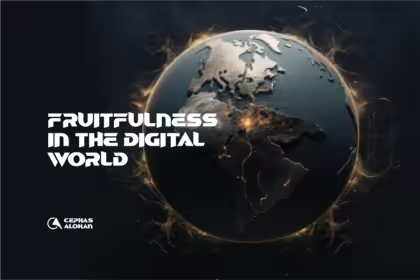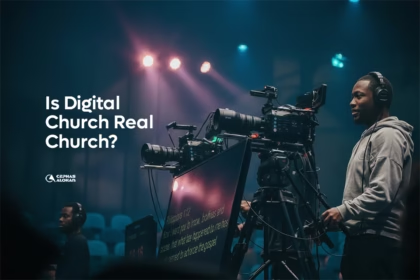In recent years, the world has been buzzing with conversations about Artificial Intelligence (AI), and rightly so. From generative AI that write sermons to design tools that generate content in seconds, AI has sparked a full-blown paradigm shift in how we engage with the digital world.
But while AI is powerful and full of potential, it is also deeply complex. Without intentional guidance, it can lead us into doctrinal compromise, data misuse, or ethical confusion, especially within the Church.
Whether we realize it or not, AI is already in the sanctuary. Pastors use it to brainstorm sermon ideas. Media teams use it to design flyers, create content and write social media captions. Choir teams might even be using AI tools to create or refine worship lyrics and visuals. It has slowly and silently integrated into the daily functions of many churches and ministries.
That’s why this is the time to act.
The solution? A Spirit-led, biblically grounded AI Policy Guide for your church or ministry. To empower your team, and ensure that technology serves your mission—not the other way around.
Before we explore how to build that policy, let’s first understand why this matters now more than ever.
Why This Matters for the Church
If we’re going to talk about the impact of Artificial Intelligence (AI), we must go beyond surface-level excitement or fear and ask the real question:
How is this tool shaping the Church, and how should the Church respond?
I recently wrote about the costly mistakes churches can make when using AI without guidance. That reflection made it clear: identifying the risks is not enough. We need a framework to prevent them. That’s where an AI policy guide comes in.
No matter your church’s size—whether you’re a team of 10 or a congregation of 10,000, you need a clear, Spirit-led approach to using AI.
Here’s why every church and ministry should take this seriously:
- AI is shaping what we know. If not guided carefully, it can introduce doctrinal influences that are not aligned with your church’s biblical convictions.
- It equips your team to use technology for God’s glory. With the right guardrails, AI can become a powerful tool for advancing the gospel through digital ministry and content creation.
- It protects your members’ privacy and data. Many AI tools collect and store information. Without a clear policy, you can expose sensitive data or violating trust.
- It helps establish boundaries; both ethical and spiritual. AI is not neutral. Defining what is acceptable ensures your ministry remains faithful to its values while leveraging innovation responsibly.
Practical Steps to Create an AI Policy Guide for Your Church
Now that we’ve laid the foundation for why this matter, the next question is how to do it. How can your church or ministry move from casual AI use to intentional, Spirit-governed implementation?
Below is a practical, step-by-step roadmap that any church, regardless of size or tech expertise, can follow to develop a clear, effective, and spiritually-aligned AI policy guide.
Step 1: Appoint an AI Policy Task Team
You don’t need a room full of tech experts. You only need spiritually grounded leaders with awareness and discernment.
Who should be on the team:
- A pastor or ministry leader
- A media or content creation team member
- A tech/admin representative
- A legal or head of admin (if applicable)
This team’s responsibility is to prayerfully lead the process of assessing AI use and defining boundaries that protect your church’s convictions.
Step 2: Host an AI Discovery Meeting
Before drafting anything, gather your team and ask:
- What AI tools are we currently using (even subtly)?
- How are they helping or hurting our spiritual goals?
- What are the doctrinal, ethical, and reputational risks involved?
Tip: Write down every tool, usage, and concern. This becomes your foundation for the policy.
Step 3: Audit Your Current and Planned AI Usage
Create a simple usage audit to bring clarity. For example:
| Tool | Used By | Purpose | Risk Level | Needs Oversight? |
| ChatGPT | Pastor | Sermon brainstorming | Medium | Yes |
| Canva AI | Media Team | Graphics & quotes | Low | No |
| Otter.ai | Admin | Transcribing meetings | Low | No |
This audit will help you know where guidelines are most needed.
Step 4: Define What’s Acceptable and What’s Not
Now, create use-case guidelines for each department. Keep it straightforward:
For Pastors:
- Use AI to summarize research or generate outlines
- Don’t use AI to write entire sermons or doctrinal materials without theological review
For Media Teams:
- Use AI to create visual content, quotes, short-form content
- Don’t use AI to create content that hasn’t been spiritually vetted
For Admin Teams:
- Use AI to automate emails, schedule events
- Don’t upload sensitive member data into AI tools without consent
Step 5: Draft Your AI Policy Guide
Now compile the findings into a simple document. Here’s a structure you can follow:
- Introduction: Why your church is using AI and your spiritual posture
- Scope: Which teams/departments the policy covers
- Tool Categories: Approved tools and their allowed uses
- Boundaries: What’s not allowed and why
- Spiritual Oversight: How tools are reviewed and approved
- Data Protection Clause: How to handle privacy and sensitive data
- Review Cycle: How often this policy will be reviewed and updated
Step 6: Train Your Leaders and Volunteers
Hold a workshop to walk staff, stewards, and volunteers through:
- What AI is
- Why this policy was created
- How it protects the church
- How to follow it in their roles
Include a prayer session for wisdom and integrity in digital ministry. Remind your team that AI is a tool, not a teacher.
Step 7: Implement With Accountability
Once trained:
- Distribute the policy digitally or in print
- Require signed acknowledgment from active team members
- Assign a point person or committee to monitor AI use and evaluate new tools
Step 8: Review the Policy Regularly
Technology moves fast, and so should your leadership.
- Review your AI policy every 6–12 months
- Invite feedback from department heads
- Update tools and guidelines as needed
- Re-align the document with scripture and your evolving convictions
Lead with Discernment in the Age of AI
Artificial Intelligence is not the future—it’s already here, shaping conversations, content, and even convictions.
As a church leader, you’re called to lead with wisdom through them. And that includes guiding your congregation and your ministry teams through the age of AI.
The rise of digital ministry, content creation, and the digital church means the lines between human insight and machine-generated content are increasingly blurred. But that’s where you come in, not to silence technology, but to steward it wisely.
AI is a tool. It can either serve the Kingdom or sabotage it, depending on how it’s used. That’s why building a Spirit-led AI policy guide is a necessity.
Your Next Steps
- Start the conversation with your leadership team
- Appoint your AI task team
- Audit your current AI use
- Download our free AI Policy Template (optional – you can request it from us)
- Train your team and lead by example
Want Help Getting Started?
If you’d like:
- A customizable AI policy template for churches
- A pre-made slide deck to train your team
- Or a consultation session on digital ministry strategy and tools
Reach out via mail, and we’ll equip you to build a future-ready digital ministry team.






